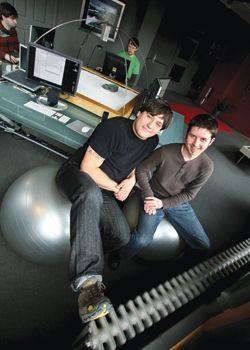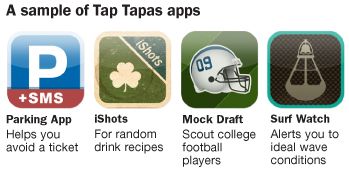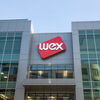iProne | Software developers in Maine cash in on the app phenomenon
Owners of Apple’s iPhone and iPod Touch have downloaded more than three billion applications in the year and a half since the company’s online store launched. That’s more than five and a half million “apps” a day, promising anything from warming up your chilly hands to helping you file your taxes at the tap of a finger.
And, as with just about anything associated with Apple these days, there’s money to be made. This fact has not escaped software developers, the brains behind those handy dandy apps.
Take Tap Tapas LLC in Portland, an application studio founded in 2008 by Maine College of Art graduates Michael DeSouza and Justin Velgos. The firm, which grew out of cgCraft, the duo’s web design and development firm, has developed six iPhone apps that have been downloaded more than 40,000 times. Mock Draft, which lets users scout the best college football players, was at one point ranked the second most downloaded sports app on Apple’s App Store. The firm’s Parking App has earned praise from Macworld and others for its parking meter timer and other ticket-avoidance features.
But DeSouza and Velgos, along with third partner Mark Woollard, have shaped their business model around an even more lucrative market — developing apps for clients who can’t or don’t want to do so themselves. In addition to computer geek technical expertise, Tap Tapas helps its clients — which include both corporate giant Toyota Australia and Portland startup AccelGolf — to visualize and design apps that go beyond just mini websites. “It’s really the translation to iPhone where we have the greatest amount of input,” DeSouza says.
About 80% of the firm’s iPhone work is for outside clients, half of whom are located out of state. Tap Tapas’ best clients actually have little sense of what their app will look like. They come to Tap Tapas saying, ‘”We have all this data. How can we make it useful?’ Then they get hungry,” DeSouza says. “We’re only limited by what we can dream up.” One of the firm’s more ambitious apps can help a university to keep in touch with alumni, reconfiguring its colors, logos and other features depending on the school.
Tap Tapas has established a $20,000 minimum fee for app projects, and so far, even without marketing, “we’ve never been in the red,” DeSouza says. He, like many in the hyper-competitive app development market, was reluctant to share revenue figures, but says earnings run from $400,000 to $450,000 a year. In fact, the firm is hiring two additional developers.
Tap Tapas — a name meant to convey both the tapping motion of using an iPhone and the characteristic variety of the Spanish bite-sized appetizers — is moving ahead not only with client work but also on its own apps, game development and corporate pairings. Diversification appears a wise move in a market that’s still searching for its iLegs. “The app development market and the business around it is still a large question mark,” DeSouza says. “Are people making money, how are they making money?”
Tough competition
Turning a profit through the App Store is far from a sure thing, especially for independent developers competing with major brands and big shot developers like Electronic Arts. Launched in 2008 and operated through Apple’s iTunes portal, the App Store made it easy for developers to write software for its devices, allowing code writers to set their own prices and pocket 70% of the proceeds. Last June, the latest iteration of the iPhone, version 3.0, included a tool that makes it easier for users to make purchases through applications.
But the App Store is now crammed with games, e-books and other applications fighting for consumers’ attention. In February of last year, 20,579 applications were active in the store, according to tracking firm 148Apps.biz. Last month, there were 158,685. The number of unique publishers behind those apps topped 32,000. And users are willing to pay less and less, with the average app price plummeting to $2.89 today from close to $5 just last fall. More than 60% of apps are either free or priced at 99 cents.
Long waits for approval, frustration with Apple’s role as gate keeper and do-it-yourself publicity also has developers looking elsewhere. As Carrabassett Valley app developer Jeff Cole puts it: “95% of the apps on the App Store are crap.” Cole was recently awarded an $11,600 Maine Technology Institute seed grant to adapt his sports iPhone app for the — gasp — BlackBerry. Writing code in the shadow of Sugarloaf mountain, Cole has devised an app that has nothing to do with skiing, but everything to do with a trait common to avid downhillers: fanaticism.
Cole’s Fan Misery Index, available on a number of apps, tells sports fans, with mathematical precision, just how miserable or blissful they should be on any given day as backers of a particular professional team. Much like the Dow Jones Industrial Average, the index incorporates statistics and fans’ personal opinions in a calculation that ranges from a rapturous zero to a despairing 10. The popular Red Sox version might, for example, show an FMI of 3.7, an it-could-be-worse showing rendered graphically by a yellow cartoon sun partially obscured by clouds. “I think they check the FMI like they check their stocks,” Cole says of his apps’ users.
Just since January, Discover Motion has launched more than one hundred $2.99 apps for every team in Major League Baseball, the National Hockey League and the National Football League, and expects to have apps for all National Basketball Association teams this month. (The Washington Nationals baseball app is free for a trial period). “The reviews have been super and it’s turning into a great business,” Cole says. Fans can weigh in on seven aspects about their team: pain and despair (historically speaking), karma, mojo, management sanity, the probability the team will “win it all,” angst and buzz. The index also tracks statistics you won’t see on the sports page, such as how well a shortstop is reaching balls. As the season progresses, the influence of fans’ opinions on the FMI wanes as statistical data piles up.
The former founder of Blue Marble Geographics, a Gardiner mapping software business that he sold about three years ago, Cole credits Apple as a partner. But BlackBerry’s version of the App Store, called App World, is a game-changer, he says. “It will instantly double our market.” Cole expects to hire two employees when his BlackBerry prototype launches in June. He’s banking on his apps’ users, who check their team’s FMIs an average three times per week. “Being a fan is a lot like religion,” he says. “People put a lot of faith in their team.”
County cred
One developer who beat the crowds is Chris York of Blue Ox Technologies in Caribou. York is best known for his Moosentration app, a memory game much like Concentration that he developed a decade ago for the desktop Windows platform. He initially gave the game away for free, but L.L.Bean came calling last year, lured by the branding potential. The Freeport retailer now licenses the game, which features iconic Maine images like L.L.Bean boots and lighthouses, from York.
York’s latest offering recalls another storied Maine brand. His new app, called Moxie, has remained among the top 20 word games in the App Store since it was released last year. “I’d call it a cross between Scrabble and Upwords and Solitaire,” York says. The free, promotional version of his Moxie app has been downloaded 100,000 times, compared to 30,000 downloads for the 99 cent app. He plans to launch a sequel to the app, which has no affiliation with the soda, in the next couple of months.
York uses yet another familiar Maine company in an analogy about finding quality apps in the App Store: It’s like going to Marden’s and rummaging through a giant bin to find what you want, he says. “I was able to develop traction before it became quite so crowded. So I have exposure in the App Store.” Last May, York teamed up with other developers to organize a joint marketing campaign to promote the best word games in the App Store.
York has run a consulting business developing software for medium and large businesses, such as Fraser Papers and Cole Haan, for 10 years. He’s also developing several other apps, including You Save!, a discount calculator for shopaholics. His app work hasn’t made him rich, but it more than pays his mortgage, York says. “I’m actually making more money from this than from my other work.”
Tap Tapas LLC
142 High St., Suite 402, Portland
Founded: December 2008
Founders: Michael DeSouza and Justin Velgos
Signature apps: Mock Draft, Parking App
Employees: Five
Contact: 956-0790
www.taptapas.com
Discover Motion LLC
5010 Elderberry Way, Carrabassett Valley
Founded: June 2008
Founder: Jeff Cole
Signature apps: Fan Misery Index sports team apps
Employees: None
Contact: 215-7826
www.fanmisery.com,
www.discovermotion.com
Blue Ox Technologies
PO Box 135, Caribou
Founded: 1997
President: Chris York
Signature apps: Moosentration, Moxie
Employees: Two
Contact: 498-2632
www.blueoxtech.com
Jackie Farwell, Mainebiz staff reporter, can be reached at jfarwell@mainebiz.biz.














Comments